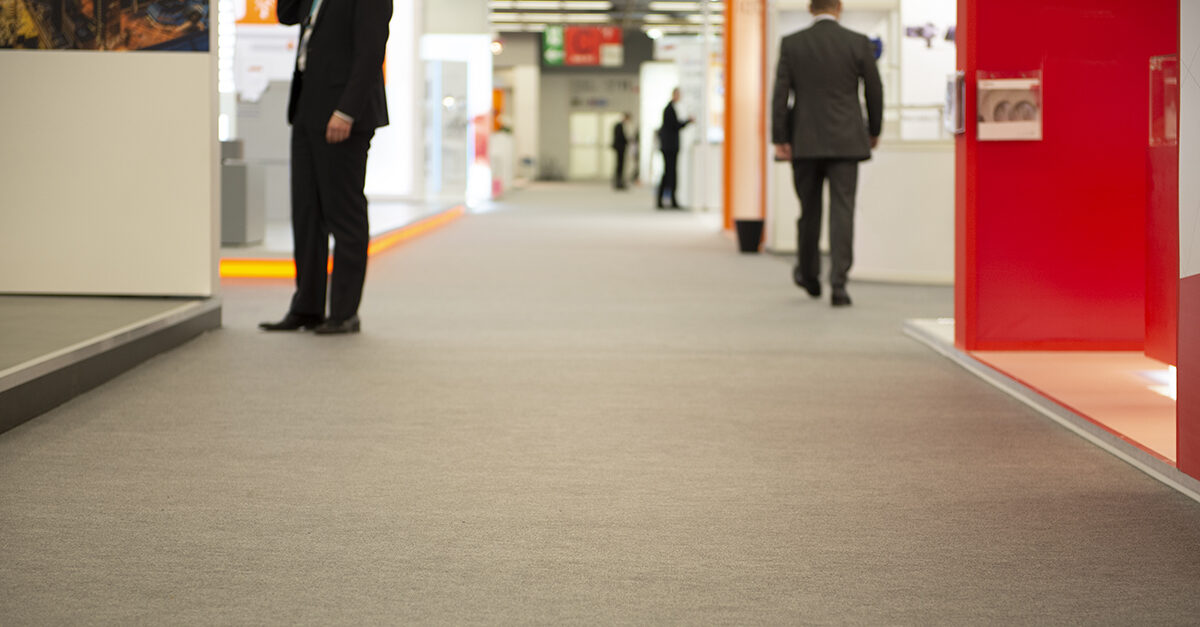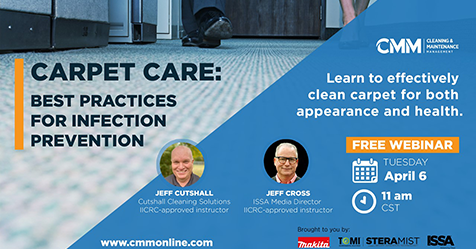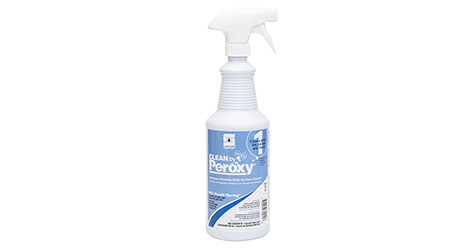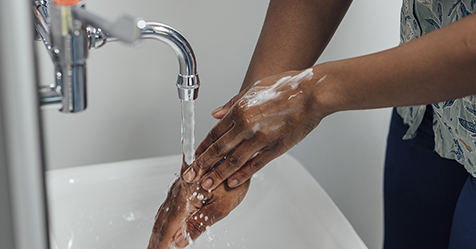As buildings reopen after pandemic-induced closures, there is a renewed focus on welcoming employees and patrons back into safe and healthy indoor environments. A building that not only looks clean, but smells fresh will make a good first impression. There are many deodorizers on the market to choose from, but some may be doing more harm than good to your building’s carpet, furnishings, and equipment.
Some business owners and housekeeping departments use powdered carpet deodorizers to keep indoor spaces smelling fresh. However, they likely do not know that most of these deodorizers are made from abrasive substances. In fact, some of these deodorizers, if used for an extended period of time, can actually cause a carpet to soil rapidly, lose its dimensional stability, and delaminate. Studies have shown that vacuuming only removes about 65% of a typical powdered deodorizer. And these products are not just harmful to your carpet—they damage your vacuum, too.
Components of powdered carpet deodorizers
There is a variety of substances found in powdered carpet deodorizers, and many are abrasive, such as baking soda, calcium carbonate, sodium silicate, and hydrated silica (sand).
Baking soda, the most common ingredient in these deodorizers, in addition to being great for baking, is also a water-soluble abrasive. It is a natural and green product that can be used to clean countertops and glass stove tops. It is also an environmentally friendly alternative for removing graffiti and restoring the appearance of old buildings. Calcium carbonate is dissolved rock. It comes from limestone and is one of the substances found in hard water. As a common ingredient in antacids, you may even chew a tablet or two of calcium carbonate to relieve heartburn.
The goal of cleaning carpet is not only to improve the carpet’s appearance by removing visible soils, but also to remove embedded abrasive soils and stop the deleterious effect these soils have on carpet fibers. As such, it’s alarming to see people intentionally spreading abrasive soil—powdered deodorizer—on carpet. This abrasive soil scratches carpet fibers, making the carpet appear lighter in color in the trafficked areas and causing the fibers to lose their luster. This creates a condition known as traffic-lane gray, which makes a carpet look unduly worn.
People use deodorizers in different ways. I know of some small business owners who sprinkle the carpet in their offices with powdered deodorizers to test that the custodial staff is vacuuming a specific area. I also know of hotel housekeeping departments that use them on a routine basis to freshen the air.
Aerosol air fresheners, the most common product people grab to freshen the air quickly, may be no better. They start out in the air but will eventually fall—right onto the face of the carpet, possibly leaving a sticky, soil-attracting residue. Even plug-in style deodorizers evaporate and become airborne oil, which leaves an oily film on everything, including the carpet. And there is, of course, a myriad of problems caused by burning scented candles.
The popularity of these products is only increasing. Global retail sales of air-care products (air fresheners) are forecasted to reach $11.7 billion by the end of 2021. In the United States alone, the demand for spray and aerosol air fresheners is expected to reach $3.94 billion in revenue by the end of 2021. That number is staggering. Smells sell! People want the air they breathe to smell fragrant, but they should know about the realities of using these products.
Effects of deodorizers on carpet
Many common powdered products come with the narrative of being green and safe to use. While this may be the case, the main ingredient in most powdered carpet deodorizers is sodium bicarbonate (baking soda). Sodium bicarbonate is an abrasive that is hydrophilic (water loving), hygroscopic (moisture absorbing), and water soluble. This means it tends to stick to carpet fibers and then scratch them every time they are walked on.
To test this phenomenon, I took two popular brands of powdered deodorizer, sprinkled them on Plexiglas, rubbed the powders with my fingers, and then wiped the glass clean. The scratches left on the Plexiglas were astonishing. These deodorizers will have the same effect on plastic carpet fibers, including nylon, polyester, triexta, and olefin. Further, the abrasiveness of the powder can also harm the plastic parts
within vacuums.
Sodium bicarbonate’s hydrophilic and hygroscopic properties make that little box of baking soda inside the refrigerator act like a mini, nonelectric dehumidifier; it removes moisture from the air inside the fridge. Low-humidity air carries less odor, which is why most odors in your home or building diminish during the heating season when the air is drier. Odors are plentiful, however, in the summer months when the humidity is higher.
Sodium bicarbonate easily dissolves in water such as when a carpet is being cleaned with hot water extraction. During cleaning, the sodium bicarbonate from the deodorizer dissolves, but as the carpet dries, the sodium bicarbonate turns back into a powder and appears as a white film over the surface of the carpet (since carpet dries from the bottom up). Correcting this issue is a challenge. Vacuuming alone will not remove it, and several encapsulating acid rinse treatments may be needed to remove the contaminant from the carpet.
Over time, some of the sodium bicarbonate and sodium silicate also sift into the backing of the carpet. The water-loving properties and alkalinity of the sodium bicarbonate and sodium silicate powder will break down the latex adhesive used to laminate the carpet backings together and could cause the carpet to lose its dimensional stability and even delaminate. In the field, I have, consequently, found higher-than-normal pH readings in the carpet in both trafficked and untrafficked areas and high-pH residue on the bottom of the vacuum.
Using aerosols to freshen the air is convenient and just fine as long as they do not leave a residue. Because of gravity, anything sprayed into the air will eventually land on the surface of the carpet and other items in your building. Spraying your air freshener on a mirror and letting it dry is an effective test of its potential effect; if the air freshener evaporates completely and leaves no residue, it should have no effect on your carpet.
It is possible to freshen the air in a building without harming people, furnishings, carpet, or vacuums—and without creating resoiling issues. Professionally cleaning carpet with hot water extraction that follows the ANSI/IICRC S100 Standard for Professional Cleaning of Textile Floor Coverings is the proper way to deodorize carpet, and as office buildings and other facilities begin to reopen, now is the perfect time to rely on professional carpet cleaning, for both health and appearance.
The bottom line
If you choose to use a deodorizer, find a product that claims to be nonabrasive and that will not damage the carpet fibers or the backing. Options are now available in which up to 98% of the product can be vacuumed out of the carpet, which is appealing when compared to a typical deodorizer’s 65%.




